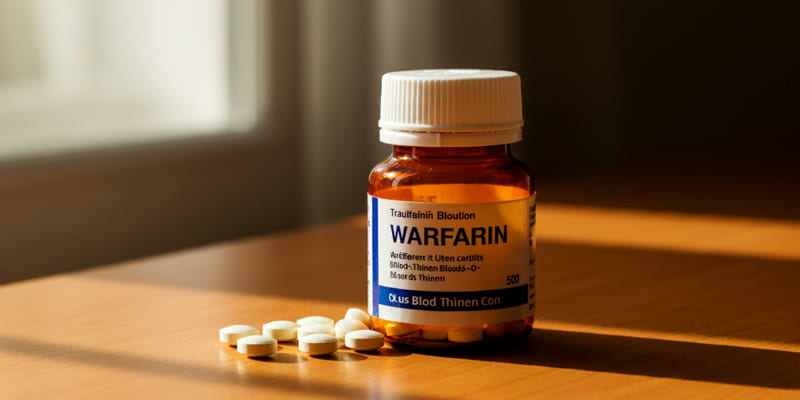Are you taking warfarin to prevent blood clots? If so, you need to know about interactions with antibiotics and antifungals. These medication interactions can impact the action of warfarin to such a degree that you will be in danger from either dangerous bleeding or clotting issues. It is essential for health and safety reasons to understand which medications do not mix with warfarin.
Understanding the Dangers of Combining Warfarin with Certain Medications

Warfarin is an anticoagulant and blood thinner commonly prescribed to patients. However, it interacts dangerously with various antibiotics and antifungal drugs, altering its effectiveness significantly and causing serious health risks. Hence, patients should be aware of these risks of warfarin and be forthright with their health professionals.
Antibiotic Interactions
Some antibiotics can enhance warfarin's blood-thinning activity and increase the risk of bleeding. For instance, some broad-spectrum antibiotics, such as ciprofloxacin and levofloxacin, slow the breakdown of warfarin. This causes an abnormally high INR. Such a high level of anticoagulation may lead to:
- Easy bruising
- Longer-than-normal bleeding from a cut
- Internal bleeding, in severe cases
Antifungal Drug Concerns
Certain antifungal drugs can also raise blood levels of warfarin by inhibiting the enzyme responsible for warfarin breakdown. Accumulation of warfarin due to fluconazole and itraconazole may further potentiate its action. The following may be the results of this interaction:
- Unexplained variation in INR
- Risk of bleeding
- Thrombosis due to undue reduction of warfarin doses. Antibiotics Interacting with Warfarin Commonly Used Antibiotic Interactions
Antibiotics that Interact with Warfarin
Common Antibiotic Interactions
Some antibiotics can interfere with the working of warfarin in your body. More common culprits include ciprofloxacin, erythromycin, and trimethoprim-sulfamethoxazole. These medications may potentiate the anticoagulant action of warfarin and increase your risk of bleeding.
Mechanisms of Interaction
There are two significant ways that antibiotics and warfarin generally interact. Some antibiotics can interfere with the normal intestinal flora that produce vitamin K, essential for blood coagulation. Other classes of antibiotics may interfere with warfarin metabolism in the liver and increase blood levels of the drug.
Monitoring and Precautions
If you're taking warfarin and need antibiotic treatment, it's crucial to inform your healthcare provider. They may recommend more frequent INR (International Normalized Ratio) testing to monitor bloodblood'sng ability. In some cases, your warfarin dosage might need adjustment during and after antibiotic therapy.
Alternative Options
Whenever possible, healthcare providers may prefer to use antibiotics that are less likely to interact with warfarin in patients on warfarin. Antibiotics like azithromycin and cephalosporins interact less with warfarin; however, individual responses may vary. Always consult with your doctor before making any alterations to your medication regimen.
Antifungal Drugs that Require Caution with Warfarin

When taking warfarin, one must know that some antifungal preparations can interact with this anticoagulant. These interactions can lead to hazardous changes in the blood coagulation tendency.
Common Antifungal Agents to Watch
Several antifungal drugs are documented as interacting with warfarin. These are:
- Fluconazole
- Itraconazole
- Voriconazole
- Miconazole
Mechanism of Interaction
Most antifungal drugs interact with warfarin because they inhibit the cytochrome P450 enzymes in the liver. This delays the metabolism of warfarin, which increases its blood levels and, therefore, its anticoagulant effect.
Monitoring and Management
If you're on warfarin and taking antifungal medication, the following is likely to happen:
- Your healthcare provider will adjust your dosage of warfarin
- Your INR will be monitored more frequently
- Alternative treatments for fungus may be considered if possible
Managing Your Medication Regimen Safely
It is essential to be safe and to avoid potential interactions when taking warfarin with other medications. The following highlights some key ways in which to manage your medication regimen well:
Communicate with Your Healthcare Team
Always tell your doctor and pharmacist about your medications, including over-the-counter drugs, nutritional supplements, and herbal products. This will put them in a better position to assess any risk of interaction with warfarin and, if necessary, take the required precautions to modify their therapy. Bear in mind that even apparently harmless substances can sometimes interact with warfarin.
Keep a Medication List
Maintain an up-to-date list of all your medications, including dosages and schedules. This comprehensive record helps you stay organized and is a valuable reference during medical appointments or emergencies. Consider using a smartphone app or a physical notebook for easy access and updates.
Follow Dosing Instructions Carefully
Take your medications exactly as your doctor directs and at the right time. Never change your dose of warfarin unless your healthcare provider tells you to. If you miss a dose of this medicine, call your doctor or pharmacist immediately for advice on catching up.
Monitor for Side Effects
Be aware of any unusual symptoms or changes in your health while on warfarin and other medications; early reporting to your healthcare provider may indicate an adverse interaction or need for dosage adjustment.
Communicating with Your Healthcare Team
Open and Honest Dialogue
Good communication with your healthcare team is essential when taking warfarin. Discuss all of your medicines with them, including over-the-counter drugs and supplements. Don't be afraid to ask questions about possible interactions or side effects. Your healthcare team is there for you and to keep you safe.
Keeping a Medication Log
Consider keeping a detailed medication list. This should include medications prescribed for you and any antibiotics or antifungal drugs. Include dosages and frequencies and any changes in your health or diet. This log can be invaluable at doctor visits, aiding your healthcare team in making the best decisions regarding your treatment plan.
Reporting Side Effects Promptly
In case of unusual symptoms or signs and side effects of warfarin with other medications, present yourself at your next appointment. You should not waste any time but call your doctor immediately. These are some of the symptoms you should not delay reporting: bleeding, easy bruising, discoloration of urine or stool, and others. Your timely communication will help avert serious complications.
Conclusion
The bottom line is one has to be very conscious of the potential drug interactions with warfarin. Always inform your healthcare provider about all current medications, including over-the-counter drugs and supplements. In case of prescription with antibiotics or antifungals, discuss the risks with your doctor and listen carefully to what he says. Regular monitoring of INR is required during and after such medications.












